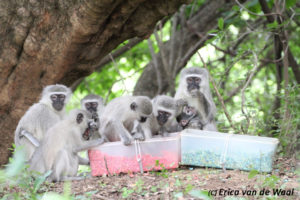University of St Andrews researchers Dr Erica van de Waal and Professor Andrew Whiten and Christèle Borgeaud of the University of Neuchâtel have just published in the journal Science about the ability of vervet monkeys to conform to local feeding traditions.
In Living Links and Budongo Trail here in Edinburgh Zoo we do multiple studies on culture and how our primates can learn from each other, however doing this in the wild can be far more challenging, a challenge that Erica, Andy and Christèle overcame with a beautifully precise and effective experiment.
Like many species, vervet monkey infants learn a lot about life from watching their mothers, especially in instances of food choice. In this study four groups of vervet monkeys (total of 109 monkeys) in the Mawana private game reserve in South Africa were introduced to two different colours of corn.
Two groups were trained to eat pink corn and two groups were trained to eat the blue. This training phase was accomplished by making the ‘unpreferred’ food colour choice taste bitter by using aloe extracts from local plants. Approximately 4-6 months after the initial training, the corn was reintroduced to the groups with neither of the coloured corn being treated, thus making both palatable options.
Interesting the monkeys remembered which was their preferred colour choice and infants that had not seen coloured corn before only ate the same colour corn as their mothers did. In fact some of the infants sat the box of the unpreferred coloured corn to eat the ‘right’ colour, says Andy Whiten.
Not only do infant vervet monkeys adopt the ‘right’ colour corn from watching their mothers, males that emigrate to new groups will conform to eat the same colour corn as their new community. For example Groot was part of a group that was trained to eat the blue corn, as all male vervets that reach sexual maturity do he left his group to find another to be part of. When he arrived he saw that they were eating the pink corn, after a brief amount of time watching them he then joined in to eat the pink corn too.
By changing his preconceived ideas on what is appropriate to eat Groot could benefit from the new groups’ local knowledge. Professor Whiten said “It may make sense in nature, where the knowledge of the locals is often the best guide to what are the optimal behaviours in their environment”, thus the “when-in-Rome” mentality makes sense.
There was one exception in the study, a male named Lekker emigrated and immediately became the dominant male of new troop and he did not adopt their feeding preferences. This then created more questions. Did he not take on their traditions because he was dominant and felt no need to adopt the social conformity, or was he just stubbornly set in his ways? Will his new group then conform to what he eats? Since this only happened in one case, more research is required to gain further insight into social status and conformity in vervet monkeys.
Reference
van de Waal, E., Borgeaud, C., and Whiten, A. (2013). Potent Social Learning and Conformity Shape a Wild Primate’s Foraging Decisions. Science 340, 483-485.

